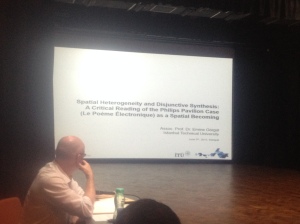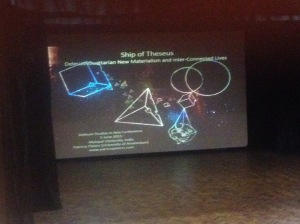 At a time when majority of universities and colleges in India have made a mockery of the terms “national conference” and “international conference” by not having either national level participation or international level participation of scholars, the Third Deleuze in Asia Conference organised by the School of Philosophy and Humanities, Manipal University was truly international in terms of the participation of plenary speakers and paper presenters from all the regions of the world.
At a time when majority of universities and colleges in India have made a mockery of the terms “national conference” and “international conference” by not having either national level participation or international level participation of scholars, the Third Deleuze in Asia Conference organised by the School of Philosophy and Humanities, Manipal University was truly international in terms of the participation of plenary speakers and paper presenters from all the regions of the world.
It was a pleasant surprise to see many young Indian scholars working with Deleuzean concepts in diverse areas.
Manipal U’s School of Humanities and Philosophy is located on a scenic location. Surrounded by Manglore tiled traditional buildings and overlooking a lake, the buildings of the school had a masterly blend of elements of traditional Mangalorean architecture with modern architecture.
 The ambience evoked different memories of the Deleuzean perspectives on architecture shared by Dr Emine Gorgul, Associate Professor,ITU-Istanbul University, Turkey, in her excellent plenary talk analysing the temporal and spatial characteristics of the “Philips Pavilion” in Brussels Expo 1958.
The ambience evoked different memories of the Deleuzean perspectives on architecture shared by Dr Emine Gorgul, Associate Professor,ITU-Istanbul University, Turkey, in her excellent plenary talk analysing the temporal and spatial characteristics of the “Philips Pavilion” in Brussels Expo 1958.
 It is amazing to relate to the Deleuzean transformation of what seemed like a nomad’s tent into one of the iconic symbols of modern architecture, thanks to the genius of Le Corbusier.
It is amazing to relate to the Deleuzean transformation of what seemed like a nomad’s tent into one of the iconic symbols of modern architecture, thanks to the genius of Le Corbusier.
The conference had an interesting format. It had opening and closing plenary sessions on all three days and an innovative Deleuze camp during May 29 2015-June 02 2015 with leading Deleuze scholars in attendance giving orientation lectures for young scholars.
There were three strong panels on the topic “Deleuze and Cinema”. Prof. Patricia Pisters, Amsterdam University, who became famous as a Deleuze scholar with her 2003 book “The Matrix of Visual Cultures” and 2012 book “Neuro Image:The Deleuzean Film Philosophy of Digital Screen Cultures” was in her best in the plenary talk entitled “The Theseus Ship”.
 She was working with Anand Gandhi’s documentary films to get us a different perspective on what we in India fail to read with Indian works.
She was working with Anand Gandhi’s documentary films to get us a different perspective on what we in India fail to read with Indian works.
The plenary talks by Dr Tatsuya Higaki (Osaka University) and Dr Daniel Smith (Purdue University) enlightened our understanding of science and technology vis a vis nature. While Dr Higaki was rooting for the place of the Osaka’s Humanoid Android vis a vis advances in metallurgy, Dr Daniel Smith was calling our attention to the misunderstandings in reading our relationship with nature during all the three phases of the history of modern science and technology (the phases of machines, energetic machines and information machines). Dr Higaki made a clever reference to the Deleuzean categories of minor and nomadic science. The minor is a state mediated one while the nomadic works on the side of nature and people. He said the science of metallurgy is the science made possible by the people who made possible the art of making swords and metal instruments for livelihood.
I made a presentation on the “Rhetorical Bodies and Movement Images in the Tamil Films of 1940s and 1950s”. My session was chaired by Dr Tatsuya Higaki who asked me the question how to take Deleuzean studies forward across the world. I said: “Deleuzean logic is Western and yet universal. However, the rapidly changing nature of theoretical boundaries and socio and political environments in different countries calls for locally grounded/modified applications of the Deleuzean universals.” The deliberations in some of the sessions showed that there were strong uncritical loyalties to Deleuze among many Indian presenters and chairs and I think this will be trap for a true Deleuzean scholarship to emerge in India as Deleuze can be best approached only critically and in the company of the detractors of his times and the present. When I mentioned the name of Zizek as one possible theoretical companion to rediscover Deleuze, a philosophy professor from JNU took offence, exposing himself (about his limited understanding of Deleuze and Zizek) and the discipline and the institution he represents. In another instance, the same person was trying to read the literal meaning of “becoming” and getting into absurd readings of the complex logic of “Deleuzian becomings” by talking about men becoming women, women becoming men and animals etc.,
On the whole, the conference became a hit with one and all. As in many other Deleuze conferences and seminars, the victim has always been his co-author Feliz Guattari, who was mistakenly ignored by many presenters in their citations. There lies the power of the Foucauldian discursive politics of the bad kind in Deleuzean studies!
I am told Mumbai and Chennai are tipped to be the future hosts of Deleuze conferences in India, according to Dr George, Manipal University, who was instrumental in bringing this edition of Deleuze conference to India.